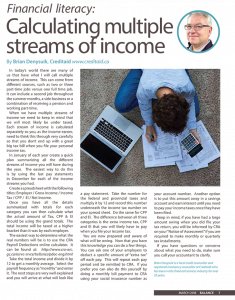Financial success is rooted in conscious planning and decision making.
It’s important to expose ourselves to tools, tips, tricks, and reminders on a daily basis that help to support our financial goals.
For a third year, Creditaid is once again a proud sponsor of the Financial Literacy Calendar published by the Manitoba Financial Literacy Forum. (See April 2016 for our tip!) The Manitoba Financial Literacy Forum is a coalition of organizations and individuals working together to promote lifelong financial education and skills to Manitobans. Being financially literate means having the knowledge, skills and confidence to make responsible financial decisions – which are important resources to have at any age.
At Creditaid, we understand that each individual has their own unique life situations. We offer many different debt solutions in order to find the best solution for each individual and circumstance. We have been helping Manitobans be debt free since 1992, and our product and service offerings continue to grow and expand to best serve our valued clients.
Click on the images below to download the calendar in your preferred language – English or French.





 Through the busyness of our own lives, we need to keep in mind that managing finances will become increasingly difficult for our parents and grandparents as they age. When a person ages they can easily lose sight of how to handle money, and even a financially astute person can quickly move to a state of being unable to cope with their finances. If this isn’t recognized it can be very stressful and costly for the elder.
Through the busyness of our own lives, we need to keep in mind that managing finances will become increasingly difficult for our parents and grandparents as they age. When a person ages they can easily lose sight of how to handle money, and even a financially astute person can quickly move to a state of being unable to cope with their finances. If this isn’t recognized it can be very stressful and costly for the elder.

